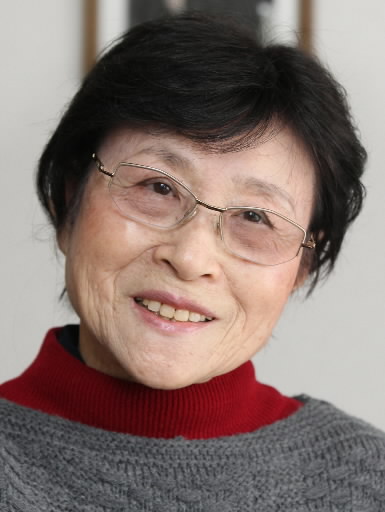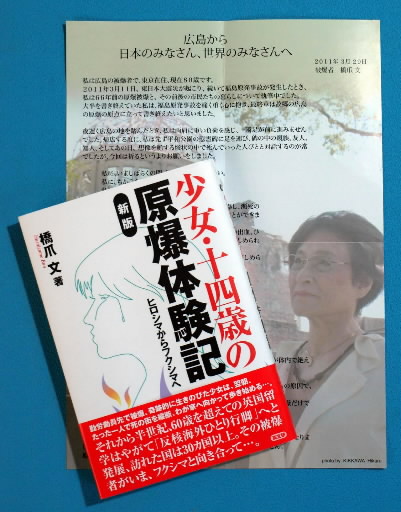Post-3/11 Reconstruction and Expression, Part 1: Viewpoints of Professionals, Bun Hashizume
Mar. 19, 2012
Bun Hashizume, 81, Poet and A-bomb survivor originally from Naka Ward, Hiroshima
by Kazunobu Ito, Staff Writer
Fukushima prompts cry of the heart
Five days after the Great East Japan Earthquake, Bun Hashizume left for Hiroshima in a Shinkansen bullet train with an unfinished manuscript. Since 2010, Ms. Hashizume has been writing about her thoughts in connection with her solo travels overseas, which she embarked on after turning 60 to make anti-nuclear appeals, as well as life in Hiroshima around the time of the atomic bombing.
“I was pondering what I should do at that time, and I decided I would complete my book and convey my experiences for posterity,” Ms. Hashizume recalled. But as she sat in her hotel room, with the manuscript in front of her, she had difficulty continuing with the work.
Anti-nuclear sentiments
Ms. Hashizume could not free her mind from the impact of the accident at the Fukushima No. 1 (Daiichi) nuclear power plant. She had always believed that nuclear energy was a force that human beings could not control and that another accident would occur somewhere in the world. “But I just never imagined that such an accident would happen in Japan,” she said. “The disaster has produced irreparable damage, putting an enormous burden on the shoulders of the next generation.” During the two weeks she stayed in Hiroshima, she made little progress on the book itself, yet anti-nuclear sentiments flowed freely from her pen.
To the people of Japan, I ask: Will we simply accept the fact that Japan, the A-bombed nation, ultimately brings about a catastrophe of worldwide radiation exposure?
Time is of the essence. We must work together to halt the nuclear power plants now in operation. “I didn’t intend to show this to anyone,” she said. “It was just my heart crying out.” Her long appeal, translated into English by a friend, is titled “Appeal of Hashizume Bun, A-bomb survivor of Hiroshima, to the people of Japan and the world,” and was distributed in flyers and made public on the Internet. In this way it gradually rippled from one person to another, through a network of kindred spirits.
Ms. Hashizume was exposed to the atomic bombing when she was 14 and a student at Hiroshima Girls’ School of Commerce (now, Hiroshima Shoyo High School). At the time she was working as a mobilized student, assigned to the Hiroshima Branch of the Postal Savings Bureau in downtown Hiroshima. She suffered a serious wound to her head, narrowly escaping death. In the following years she had to be hospitalized several times with such symptoms as a high fever and severe diarrhea.
“For some time after the bombing, there was no information about it at all, and I wasn’t even aware that it had been an atomic bomb,” she said. “Of course, I didn’t know anything about the dangers of internal exposure to radiation.” To receive medical treatment for her intractable illnesses, she moved to Tokyo at the age of 24. Even today, she suffers from extreme fatigue.
In her forties, with her poor health persisting, she was told she had only six months to live. Wanting to leave something behind for her three young sons, she began writing poetry.
The entire city was on fire
Lives were long since terminated
Death went past over the two people
They were in a space beyond life and death
Before long
Golden sparks
Will bury their bodies
Excerpt from Deai (Encounter)
When one of her sons was a high school student, he asked her: “You say you want peace, but why aren’t you doing anything about it?” His words prompted her to write poems about the atomic bombing. Then, after reaching the age of 60, she began learning English and traveling abroad on her own, making anti-nuclear appeals and calling for peace.
Adding thoughts on Fukushima
The appeal she wrote in Hiroshima after the nuclear accident was met with a huge response, and she was invited to share her A-bomb experiences in a radio program last summer. After that, many inquiries were made about her 2001 book “A Fourteen-year-old Girl’s A-bomb Experiences,” published by Kobunken Co., Ltd., which resulted in the publication of a new edition of the book, to which she added her thoughts on Fukushima.
In a letter she wrote three years ago to U.S. President Barack Obama, she said: “Nuclear abolition should include nuclear energy in addition to nuclear weapons. I fear that nuclear power plants will destroy the earth.”
Due to poor health, she is finding it hard to move forward with her work. But as an A-bomb survivor, her sense of mission has been strengthened by the Fukushima accident. “The two people who saved me from near-certain death have passed away. I’m determined to finish my book, listening to the silent voices of those 70,000 victims whose remains rest in the Atomic Bomb Memorial Mound,” she said. Ms. Hashizume is hoping to complete her work in Hiroshima, where she experienced the atomic bombing and began pondering the perils of nuclear weapons and nuclear energy.
Profile
Bun Hashizume
Member of the Japan P.E.N. Club and the Japan Poets’ Society. While engaged in writing, she has visited more than 30 countries, making anti-nuclear appeals. Her books include the collection of poems “Chi ni kaeru mono, Ten ni noboru mono” (“What Returns to Earth, What Ascends to Heaven”), published by Sunagoya Shobo. She is a resident of Machida, Tokyo.
(Originally published on March 2, 2012)









